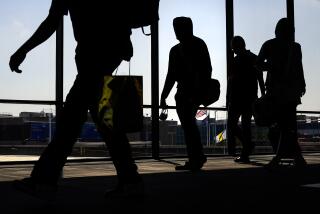High-income fliers are unhappier with airlines, survey says
With airfares on the rise and airlines cramming more fliers per plane, it’s no surprise that passengers are feeling increasingly unhappy about the service they get from U.S. carriers.
And well-heeled passengers — who presumably spend more on airline flights — feel even worse about the service they get, according to a survey released last week.
Fliers with annual household incomes of $100,000 or more are nearly twice as likely as travelers from households making less than $50,000 a year to have negative feelings toward their airline, according to an online survey by the Connecticut marketing research firm PhoCusWright.
The reason: Business travelers and affluent fliers said they didn’t feel they were getting their money’s worth.
“When you spend that much money, you have higher expectations,” said Carroll Rheem, the firm’s research director. “There is definitely a connection between price points and satisfaction.”
Thirty-two percent of fliers with incomes of more than $100,000 had somewhat negative or very negative sentiments toward their airline, according to the survey of 1,559 people. Only 17% of fliers with incomes of less than $50,000 felt that way.
Part of the reason for the negative feelings, Rheem said, is that passengers must pay fees to check bags, get better seats and receive meals, among other things.
“Passengers are not happy,” she said, “because they are being charged for things they didn’t pay for before.”
• Upgrade planned for Burbank airport
Anyone who has ever flown from Burbank’s Bob Hope Airport knows it’s a cramped, aging facility that is nonetheless popular among fliers from the San Fernando and San Gabriel valleys.
But the airport is working on upgrades, starting with construction this summer of a $120-million transit center to house its car rental companies. The center will also provide better access to the Amtrak, Metrolink and bus stations.
The transit center will be on the south end of the airport, near West Empire Avenue, and an elevated moving walkway will connect it to the terminal, airport spokesman Victor Gill said.
The center will provide room for more car rental agencies, thus increasing competition, he said.
The convenience will come with a cost. To help pay for the center’s construction, the Burbank-Glendale-Pasadena Airport Authority is eliminating the one-time $10 facility improvement fee that passengers pay when they rent a car. Instead, the airport will charge a $6 per day rental fee for up to five days or a maximum of $30.
The new center should be open by December 2012.
• Wi-Fi to be added on 200 Continental planes
The last three years have been an era of airline mergers and acquisitions.
The biggest of the recently announced mergers — the marriage of United Airlines and Continental Airlines — should be completed this year. When the two airlines operate as one called United, it will fly more than 700 aircraft.
But pulling off all the details of an airline merger can be tricky.
For example, United Continental Holdings Inc., the parent company of the merging airlines, announced last week plans to install wireless Internet service on 200 Continental aircraft.
Since 2009, United has provided airborne Internet on only 14 planes through Illinois-based Aircell, the ground-to-air Internet provider for seven other major airlines in North America.
But instead of adding Aircell Internet service to the Continental planes, the merged airline will use the Wi-Fi services of Florida-based LiveTV, which already provides satellite-based television on dozens of Continental planes.
United Continental spokesman Rahsaan Johnson said using LiveTV for the Internet service would be easier for the airline and enable it to keep the existing satellite TV service.
United charges a flat $12.95 fee to connect to the Aircell service. The price to use the Wi-Fi service on the Continental aircraft has not been announced.
More to Read
Inside the business of entertainment
The Wide Shot brings you news, analysis and insights on everything from streaming wars to production — and what it all means for the future.
You may occasionally receive promotional content from the Los Angeles Times.









